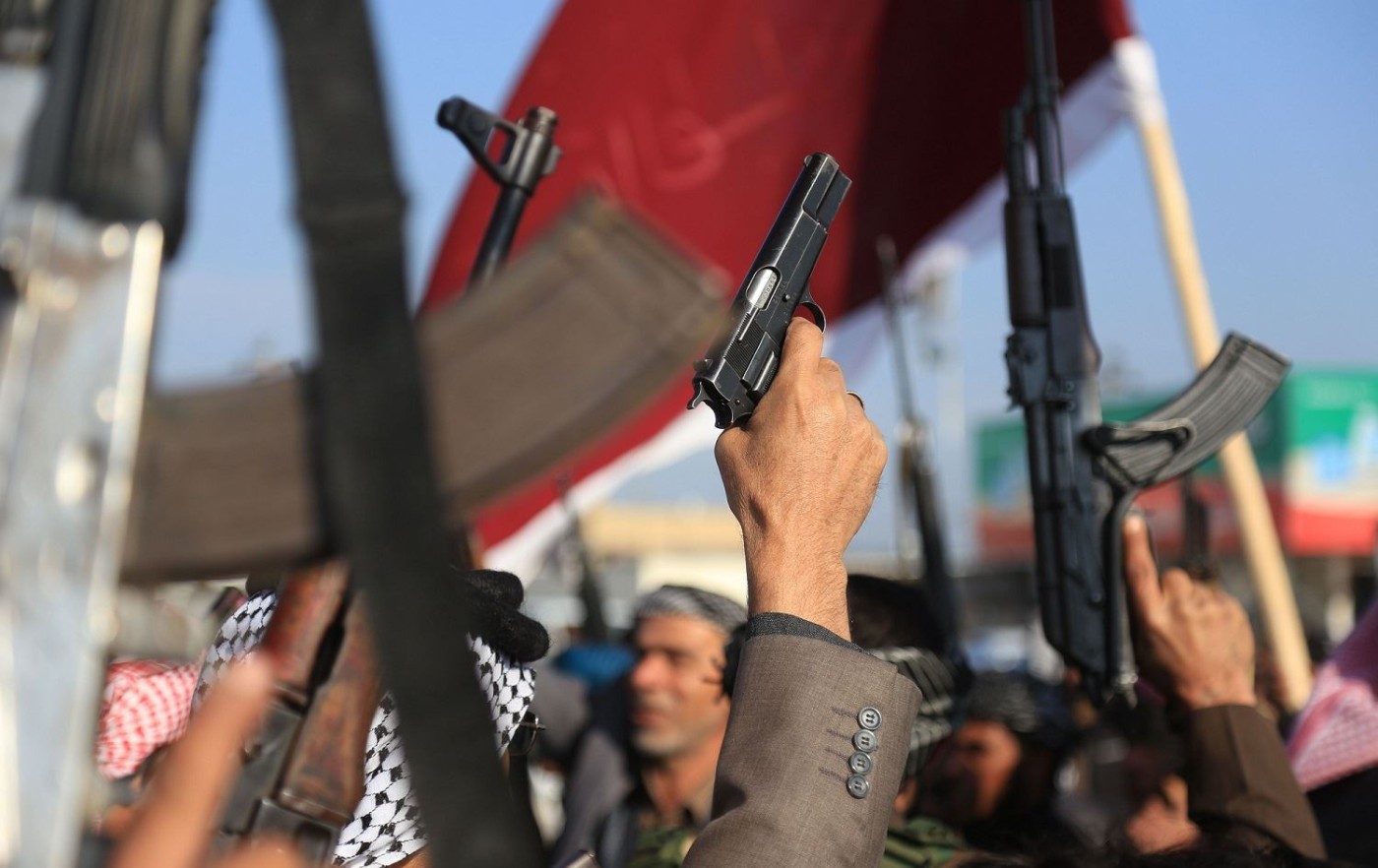BAGHDAD, Iraq - He had never imagined that simply guarding a voting station might lead to an attack on his home.
Or threats from an entire tribe.
“Adel”, a member of the security forces in the Iraqi capital who asked that his real name not be used, said he was still shocked by what had happened to him two years ago in the al-Obaidi area in the eastern part of Baghdad.
“I was on duty as part of the security forces guarding the October 2021 parliamentary elections. I stopped one of the voters from entering from the wrong door,” he told The New Region in an interview on December 15.
“The man got angry and insulted my family. When I tried to calm him down, he physically blocked me. This forced me to push him.”
A few hours later the home of the member of the security forces, also in eastern Baghdad, was showered with bullets.
‘Atwa’, or temporary ceasefire
“They asked us for a sort of tribal pledge and then an ‘atwa’,” he said, his eyes widening in shock even now.
‘Atwa’ literally means ‘gift’. It is used in tribal contexts to mean a ‘gift of restraint’ in relation to temporary truces within tribal disputes.
Adel noted that the family of the man had demanded a large amount of money as compensation for the harm suffered.
“But he was only a bit scratched up” from the incident, Adel claimed.
This ‘gift of restraint’ is a period given by the victim’s family to the perpetrator's family after the crime during which a third party – normally a highly esteemed sheikh – intervenes as the first step towards resolving the crisis.
Both parties are obliged not to engage in any attacks on each other during the period agreed, which can be weeks or months. In the case of murder, such a period can be as long as a year.
In the case of ‘honor killings’, notably, this ‘gift of restraint’ is often an essential means to at least initially damp down any flames before they spread.
Adel’s case is by no means an anomaly. Doctors, university professors, teachers, and drivers all suffer such incidents and their repercussions, seen on a daily basis across much of the country.
Some cases have even entered the political arena. The tribe of parliament member Hanan al-Fatlawi demanded tens of thousands of dollars from the clan of Hikma Movement’s Baligh Abi Kalal after the latter made statements against Fatlawi on television.
Years later, the same tribe warned MP Faiq Sheikh Ali of “serious consequences” after other “offensive” statements against Fatlawi.
Blame placed on the US and ‘abhorrent sectarianism’
Thaer Makhif al-Jubouri, a well-known sheikh and member of parliament from the Babil province south of Baghdad, noted in a December 16 interview with The New Region that tribal conflicts are not new and date back to when these same tribes lived mainly in the desert.
However, he stressed, Iraqi and tribal “values and equilibriums [between the tribes] were disturbed after the US occupation of Iraq in 2003”.
Jubouri noted that “the head of the former regime, Saddam Hussein, tried to diminish the power of the tribes at one point, telling the authorities not to use tribal names.”
However, “the 1991 Shaabani uprising prompted Saddam Hussein to recognize the power of the clan. He then called tribal leaders the ‘pillars’ of the people,” he added.
“The chaos ensuing after 2003,” he added, “is the result of people who have nothing to do with leading the tribe but are trying to appear important in front of their peers.”
Adding to this, he said, is “the abhorrent sectarianism that at a certain point tarnished the reputation of the tribes.”
Most tribes encompass both Shia and Sunni branches.
Throughout Iraqi and regional history, “tribes have had a major role in the revolutions and standing up to tyrants, in addition to reducing sectarianism later on,” Jabouri stressed.
“There are individual actions by people who do not differentiate between truth and falsehood,” he noted. “However, they are not representative” of the tribes as a whole.
“Whenever the state fails to properly carry out its security, political, and administrative” duties, he said, such security-related tribalism increases.
The sheikh from the Babil province said, however, that tribes with a long history behind them “reject practices” such as shielding certain individuals from the law or exploiting weak members of other tribes.
These practices, he stressed, appear as part of this “security-related” tribalism.
Laws governing tribal crimes and their history
On the founding of the Iraqi state in 1920, a tribal law was imposed by the British on the country. The British preferred to deal with the country’s tribes rather than with the political, social and civil forces within it.
After the July 1958 revolution, however, tribal law was abrogated and laws enacted by the state were the only ones to be have been officially enforced from then on. Civil status documents also stopped listing what tribe the holder was from.
Tribal conflicts expanded in Iraq after the fall of Hussein's regime in 2003, especially in the central and southern regions. This prompted successive governments to include tribes in the political process.
The expansion of tribal power is however not limited simply to the post-2003 period as it was also occurring during the Iran-Iraq war and in the period following the 1991 uprising.
At that time, Saddam Hussein’s regime took control by restoring tribal authority, going so far as to issue pardons for prisoners found guilty of murder.
Many people including those who had previously had no relation to the tribes for various reasons then turned to them to get their relatives released.
After 2003, the proliferation of weapons in general - and among tribes in particular - endowed them with more strength due to the variety of light, medium, and heavy weapons in their possession.
Tribal clashes decreasing
An Iraqi interior ministry official told The New Region in an interview on December 16 that there had been a drop in tribe-related attacks and shooting during celebrations in the final months of 2023, noting that efforts were being made to bring in a community peace law.
The interior minister’s assistant for tribal affairs, Maj. Gen. Nasser Al-Nouri, said that the “tribal affairs directorate has identified tribal conflicts occurring most frequently and taken action to reduce them.”
He added that the tribal affairs directorate works to keep tribal problems and pressure under control by meeting with tribal sheikhs and notables before conflicts break out.
“The interior ministry’s introduction of a community peace law is a good step,” he said, stressing that the law would be approved by the relevant legal department and then sent to the Iraqi parliament.
In July 2023, the tribal affairs directorate announced a working paper on the subject of a community peace law.
Interior Minister Abdulamir al-Shammari issued orders related to five points presented in the paper, criminalizing and increasing penalties for tribal attacks, shooting during celebrations, attacking state employees - with a special focus on teachers and doctors – and displacing families during tribal conflicts, as well as for attacking security officials when on duty.
Nouri added that the law “will hold the violating tribe accountable and lead to the arrest of its sheikhs” and that shooting as a celebratory act had decreased significantly in all provinces since then.
He went on to stress that tribal mudhifs should serve to foster “greater awareness and education for members of the tribe, especially as concerns drugs, since this has become linked to terrorism”.
Weak state and ‘political exploitation’
“The strength of tribes indicates the weakness of the state,” security affairs researcher Ahmed Al-Sharifi told The New Region in an interview on December 16.
“A characteristic of state failure is when individuals opt to resolve disputes amongst themselves” instead of going to the authorities, Sharifi said, evincing a lack of trust in law enforcement.
“Resorting to the clan in everything is a characteristic of primitive societies, “ he added.
Sharifi noted that “power is when there is influence and prestige,” pointedly asking “who actually has prestige, tribes or the state?”
“When the state begs the tribe for approval and support, this leads to a greater role played by tribes at the expense of the state,” he stressed.
“Politicians resorting to the clan in electoral forums and political marketing makes them into figures closer to the tribes instead of the masses,” Sharifi said.
However, the main point, he added, is that tribes holding authority is incompatible with modern states based on citizenship.



 Facebook
Facebook
 LinkedIn
LinkedIn
 Telegram
Telegram
 X
X


